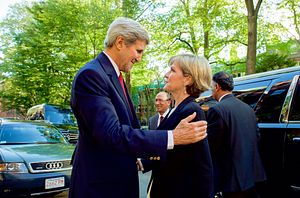WASHINGTON, D.C. – The United States and Australia should boost defense ties as Canberra struggles with balancing its foreign relations amid China’s rise, a former Australian defense official told a forum in Washington, D.C. Tuesday.
Australia is struggling with how to balance its growing economic relationship with China with its more comprehensive alliance with the United States, Peter Jennings, the former deputy secretary for strategy at Australia’s defense department said at a conference at The Heritage Foundation, a Washington, D.C.-based think tank.
As the public debate continues about how Australia should manage its ties with China and the United States, Canberra and Washington should move to more actively work their alliance, particularly be speeding up defense cooperation.
“I think the U.S.-Australia alliance is still remarkably strong, but the debate around the challenges of balancing economic and security priorities is still very much alive,” he argued.
In order to strengthen the alliance, Jennings, now the executive director of the Australian Strategic Police Institute, a think tank, suggested that Washington and Canberra do five things.
First, he recommended speeding up the enhanced cooperation agenda. Discussions around increasing Australia’s cooperation with the U.S. marines and air force out of northern Australia back in 2011, he said, have been moving at a glacial pace thus far, and phase three of cooperation around operating a major U.S. fleet unit out of a naval base in western Australia had been put off indefinitely.
“So I’d suggest bring this on far more quickly,” he urged.
Second, considering the fact that both Washington and Canberra face the common challenge of balancing the security and economic dimensions of their relationship with China, he called for a stronger joint analytical effort on how to manage this issue. Since the September 11 attacks, Jennings noted, both intelligence establishments had spent a significant balance of their resources on tackling the challenge of terrorism, rather than tackling the China challenge, leading the traditional counter-intelligence function to become “somewhat atrophied.”
“I think there would be a value in establishing a joint analytical effort involving intelligence and national security agencies looking more closely at how to manage these types of complexities,” he suggested.
Third, he called for more both sides to manage the alliance more actively. The current frameworks for the U.S.-Australia alliance, he said, were adequate for the 1980s and 1990s but not enough to set out the strategic ground to manage problems when they arise or create momentum when needed to break through bureaucratic inertia.
“An annual meeting supported by officials is really not enough,” he said.
Fourth, he suggested that Australia could help make the Joint Strike Fighter a critical part of bringing together users of the aircraft – Japan, South Korea, Australia, various units out of the U.S. Pacific Command and possibly Singapore – into using the platform more as “an alliance and close friends asset.” Outside the continental United States, Jennings emphasized, it is only Australia which has the capacity among the Asia-Pacific Joint Strike fighter partners to offer overland training for all aspects of the aircraft’s capabilities, including actually launching live weapons.
In this way, he suggested, Australia “could become a central part of honing the capabilities between allies and the closest partners of the United States.”
Fifth and lastly, he said that both the United States and Australia should look beyond bilateral cooperation and pursue opportunities for trilateral defense cooperation in Southeast Asia, particularly with Singapore and Indonesia.
“It’s time now to look at trilateral cooperation,” he urged.
Overall, Jennings reiterated, the focus should be on trying to more actively work the alliance for the future instead of being complacent about what it had accomplished in the past.
“The bottom line message against all of these is the need to more actively work the alliance relationship, not simply be content with statements about how…our forefathers have fought together for generations,” he stressed. “Even though that’s true, I don’t think that’s sufficient really to sustain the alliance as we move into coming decades.”

































